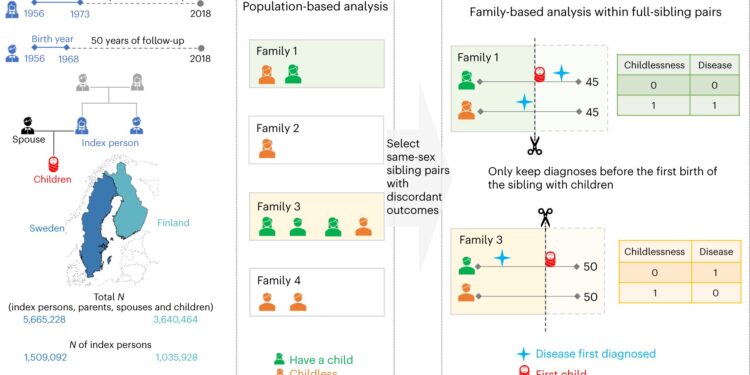Schematic overview of the study. Credit: Human behavior (2023). DOI: 10.1038/s41562-023-01763-x
A study published in Human behavior examines the link between 414 early-onset diseases and lifetime infertility among more than 2.5 million people born in Finland and Sweden. The international research team was led by Aoxing Liu and lead authors Melinda Mills and Andrea Ganna.
In many countries in Western Europe and East Asia, up to 15 to 20 percent of people born around 1970 are now childless. Although multiple social, economic, and individual preferences have been studied, little research has been conducted on the contribution of different diseases to infertility across the lifespan, particularly diseases appearing before peak reproductive age.
Dr Aoxing Liu, lead author of the study and a postdoctoral researcher at the Institute of Molecular Medicine at the University of Helsinki in Finland (FIMM), said: “Various factors lead to an increase in infertility in the world, with delayed parenthood being an important contributor that could potentially increase the risk of involuntary childlessness. Our study is the first to systematically explore how several early life diseases are linked to lifelong infertility and low parity in men and women.
Using national registries, researchers analyzed information on 414 early disease diagnoses in 1.4 million women born between 1956 and 1973 and 1.1 million men born between 1956 and 1968. All were alive at the age of 16, had not emigrated and had mostly completed their childbearing period by the end of 2018 (defined as age 45 for women and age 50 for men).
Sex-specific and age-of-onset-dependent effects of the association between disease diagnoses and infertility among 71,524 full-sister pairs and 77,622 siblings who were discordant with respect to infertility. Credit: Human behavior (2023). DOI: 10.1038/s41562-023-01763-x
The study’s main analyzes focused on 71,524 full-sister pairs and 77,622 sibling pairs who had differences in their childlessness status. Interestingly, the association between disease and childlessness was more similar between childless individuals and their siblings who had only one child, compared to those who had more children.
Of the 74 conditions significantly associated with infertility in at least one sex, including 33 common to both women and men, more than half were mental and behavioral disorders. Additionally, several new associations between disease and infertility have been discovered, including autoimmune and inflammatory diseases. A full list of results is available on this interactive dashboard.
A quarter of the 1.1 million men studied were childless, compared to 16.6% of the 1.4 million women. In Finland and Sweden, people with lower levels of education were more likely to be childless compared to the general population, and being childless was notably linked to their parents’ education level. parents.
Researchers also observed significant gender differences in the relationships between disease and infertility. For example, schizophrenia and acute alcohol intoxication had stronger associations with infertility in men, while diabetes-related illnesses and birth defects had stronger associations in women.
Gender differences were noticeable in age of disease onset, with stronger associations earlier for women diagnosed between ages 21 and 25, and later for men diagnosed between ages 26 and 30. . For example, obese women experienced higher rates of infertility if they received their initial diagnosis between ages 16 and 20, compared to those diagnosed later.
Professor Melinda Mills, lead author and director of the Leverhulme Center for Demographic Science at Oxford Population Health, said: “As well as strengthening demographic research into assortative mating and other socio-economic factors linked to infertility, This article highlights the need for interdisciplinary research and an improved audience. In terms of health, the emphasis is on combating early diseases in men and women in relation to infertility.
The study also found that the absence of a partner played a significant role in the link between diseases and infertility, accounting for approximately 29.3% in women and 37.9% in men. People without children were twice as likely to be single, while six diseases in women and 11 in men remained associated with childlessness among people in relationships.
Associate Professor Andrea Ganna, lead author and head of the FIMM-EMBL group at FIMM, University of Helsinki, concluded: “This study reveals a link between early-onset diseases and infertility, influencing women and men differently singles and couples. several early-life illnesses on infertility among 2.5 million people in Finland and Sweden, this study paves the way for a better understanding of how illness contributes to involuntary infertility and the need for improved public health interventions.
The study recognizes the need for additional data to distinguish the impacts of voluntary and involuntary childlessness, and for additional research to improve the generalizability of the findings beyond the Nordic countries and to more recent cohorts with more advanced treatments, practices evolving reproduction and partnership.
More information:
Aoxing Liu et al, Evidence from Finland and Sweden on the relationship between early-onset illness and life-course infertility in men and women, Human behavior (2023). DOI: 10.1038/s41562-023-01763-x
All results (aggregated data) can be explored on an interactive online dashboard.
Provided by the University of Oxford
Quote: Early diseases linked to infertility throughout life (December 18, 2023) retrieved on December 18, 2023 from
This document is subject to copyright. Apart from fair use for private study or research purposes, no part may be reproduced without written permission. The content is provided for information only.



